Overview
The article underscores the substantial advantages that custom software provides to SaaS product owners, emphasizing its critical role in enhancing operational efficiency, scalability, and competitive advantage. This assertion is bolstered by compelling statistics and real-world examples that illustrate how tailored solutions drive increased productivity, lower operational costs, and elevate user experiences. Ultimately, these factors position businesses for sustainable growth within a competitive landscape.
Introduction
Custom software development is emerging as a transformative force for businesses, especially for SaaS product owners navigating a competitive landscape. By tailoring solutions to meet specific operational needs, organizations can unlock a range of benefits, from increased efficiency to enhanced security. Yet, as the demand for customization grows, a critical question arises: how can businesses effectively leverage custom software to streamline operations and foster sustainable growth? This article explores ten compelling advantages of custom software, demonstrating how it can revolutionize the way SaaS companies operate and thrive in an ever-evolving market.
SDA: Tailored Custom Software Development for Business Growth
SDA excels in custom software development, providing tailored solutions that meet the unique requirements of diverse industries. By prioritizing user-centric design and seamless technology integration, SDA empowers businesses to enhance operational efficiency and stimulate growth. Their expertise spans sectors such as healthcare, fitness, and SaaS, establishing them as a crucial partner for organizations aiming to harness technology effectively.
Recent statistics reveal that businesses investing in custom software can achieve a productivity increase of 20-30%. As Sonika Vishwakarma, CEO of Soluzione, articulates, "When you invest in tailored applications, you possess the rights, granting you complete control over its functionality and future enhancements." This underscores the importance of for sustainable growth. Furthermore, with the global custom software development market projected to reach approximately $120.22 billion by 2029, the demand for tailored program offerings is on the rise.
Emerging trends, including the integration of artificial intelligence, the Internet of Things (IoT), and the Internet of Behavior (IoB), are reshaping the landscape of custom software development. These advancements enable enterprises to enhance workflows and elevate user experiences, rendering tailored approaches not merely a luxury but a necessity for maintaining a competitive edge. As organizations increasingly recognize the significance of customization, SDA remains at the forefront, providing innovative strategies that deliver measurable outcomes and foster long-term success.
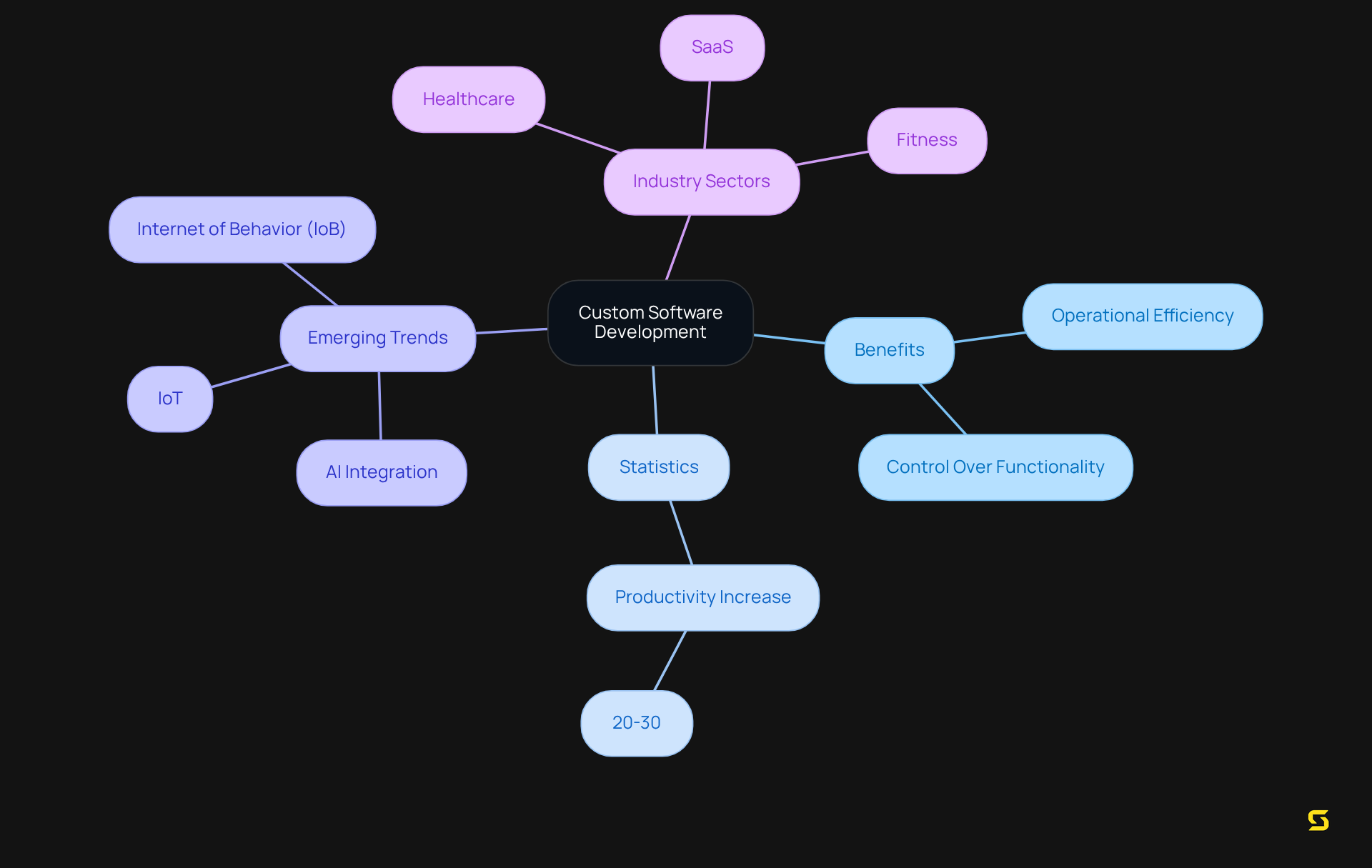
Enhanced Flexibility: Custom Software Adapts to Your Unique Needs
Custom software provides exceptional adaptability, allowing companies to tailor features that align with their unique procedures and workflows. Unlike off-the-shelf solutions, which often necessitate operational changes, are designed to evolve alongside the organization. This adaptability ensures that the system remains relevant and efficient as business needs change.
For instance, organizations utilizing personalized applications report an average operational productivity improvement of 30%, according to Forrester Research. This statistic illustrates how tailored solutions can significantly enhance efficiency. Furthermore, 74% of organizations believe that custom software solutions are essential for maintaining competitiveness in their respective markets, as highlighted by a study from PwC.
By integrating advanced technologies and bespoke features, organizations can create systems that not only meet current needs but also anticipate future growth, ultimately yielding a substantial return on investment within 12 to 24 months. In fact, companies can achieve a remarkable 95% return on investment over three years with personalized applications. This strategic investment in tailored applications positions organizations to excel in a constantly evolving digital landscape, supported by modular architecture that facilitates seamless capability expansion without the need for extensive modifications.
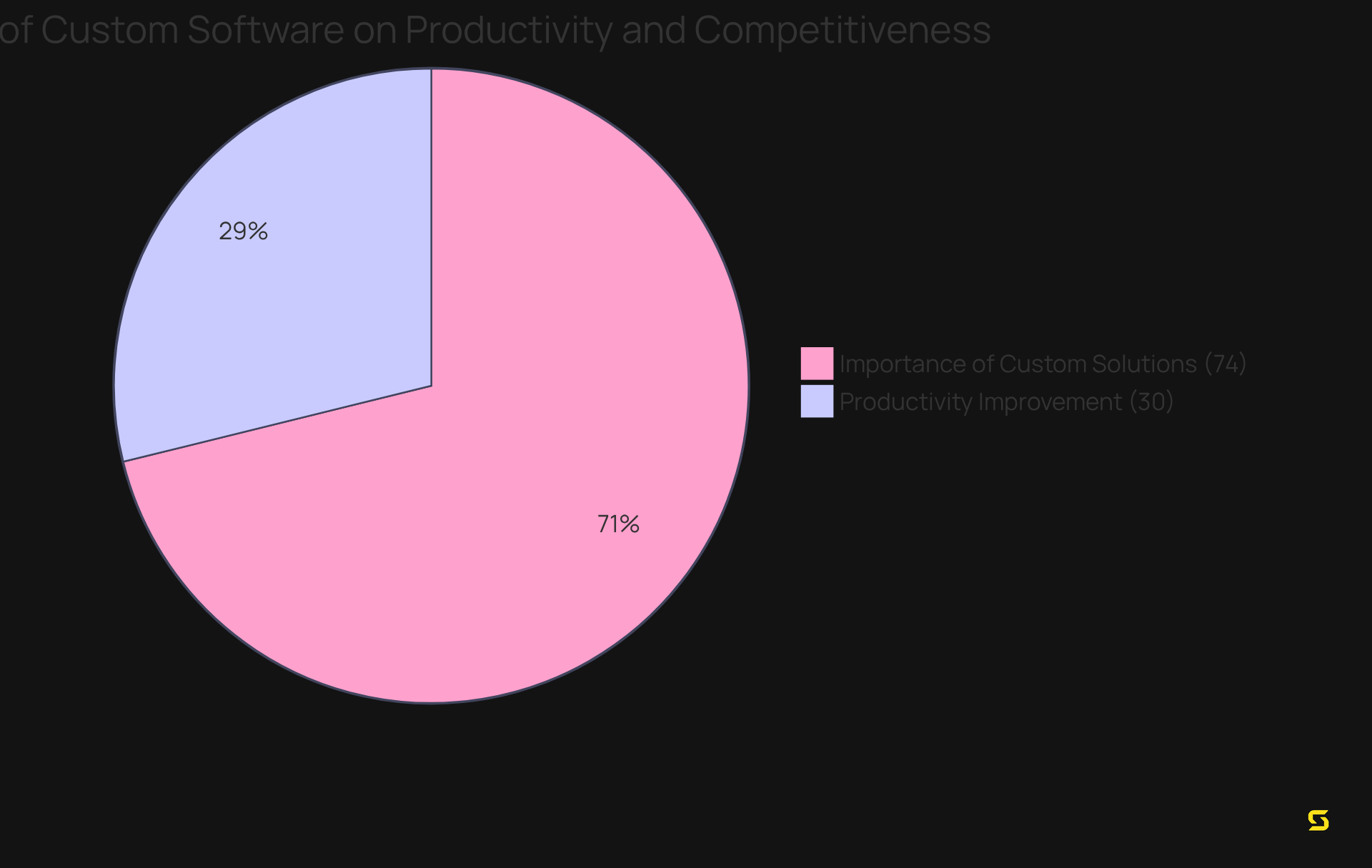
Scalability: Grow Your Business with Custom Software Solutions
Custom software applications are expertly crafted for scalability, enabling companies to efficiently manage increased workloads and evolving user demands. As your SaaS product expands, these custom software solutions can be adapted to incorporate new features and functionalities, ensuring optimal performance even as user numbers rise.
Organizations leveraging affordable tailored applications for small enterprises have reported a 10-15% reduction in operational expenses alongside a 25% boost in employee efficiency. For instance, CloudFundr transitioned from a SaaS tool to tailored solutions, resulting in a 30% decrease in customer onboarding time and doubling their partner acquisition rate.
This adaptability not only addresses immediate operational needs but also positions companies for , empowering them to respond swiftly to market changes and customer expectations. By investing in custom software, organizations can secure a competitive advantage, ensuring their systems evolve in alignment with their operational goals.
As industry specialists assert, "Investing in bespoke application development for organizational scalability is more than just a temporary expense; it’s a strategic choice that yields lasting cost-efficiency and a significant increase in ROI.
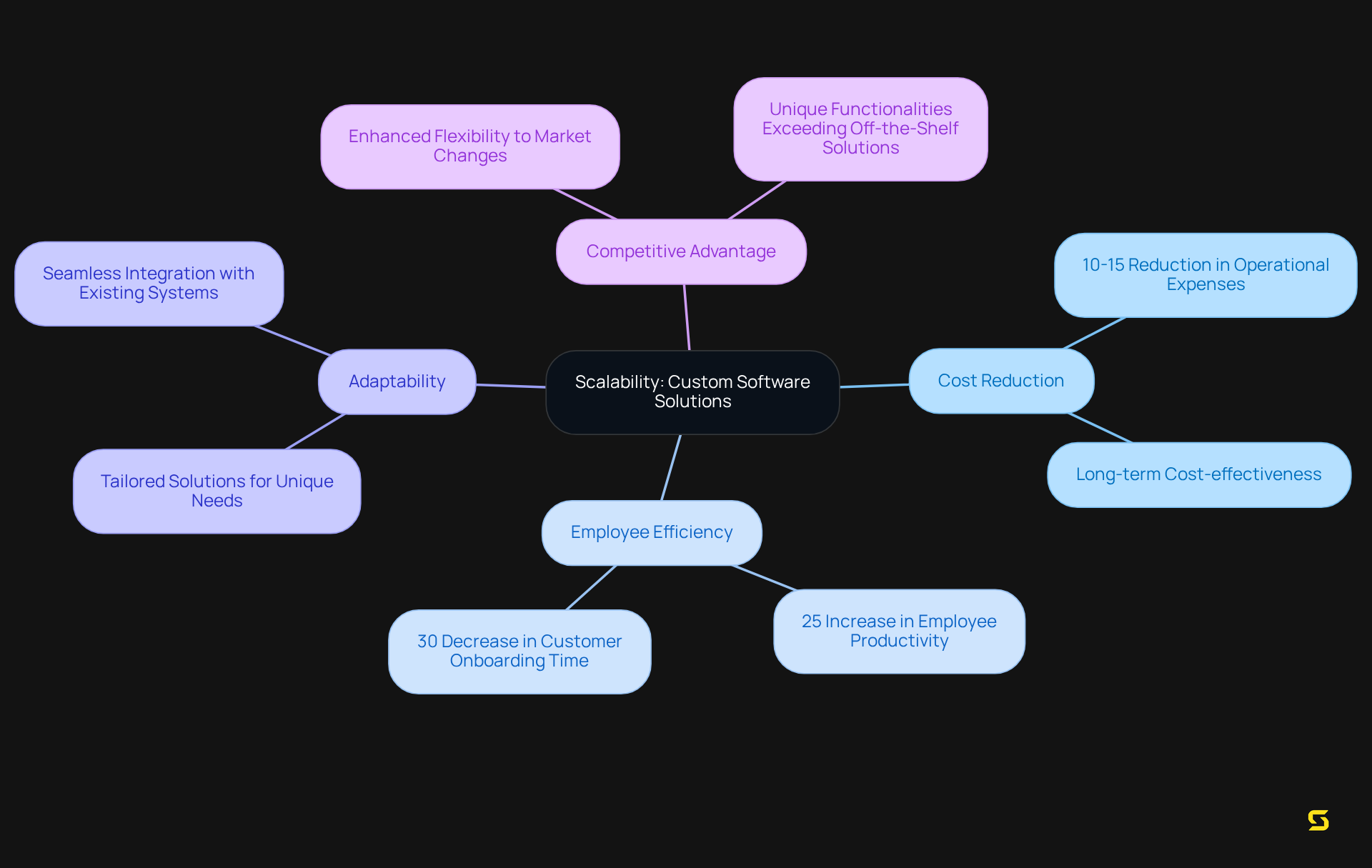
Increased Efficiency: Streamline Operations with Custom Solutions
Tailored technological solutions significantly enhance operational efficiency by automating repetitive tasks and integrating diverse functions into a cohesive platform. This integration not only but also minimizes errors, empowering teams to focus on strategic initiatives that drive business growth.
For instance, a mid-sized e-commerce firm that adopted tailored solutions reported an impressive 40% increase in operational efficiency and a 25% boost in customer satisfaction. Furthermore, organizations leveraging data-driven decision-making through bespoke applications have experienced an average profit performance increase of 6%.
By streamlining operations, tailored applications enable businesses to optimize workflows, enhance productivity, and ultimately secure a competitive edge in their markets. The automation features inherent in these tailored approaches allow organizations to eliminate redundancies and improve system integration, leading to heightened customer satisfaction and cost-effectiveness.
Additionally, organizations often face inefficiencies stemming from multiple program licenses, with unnecessary licensing expenses exceeding $250,000 annually. As companies increasingly recognize the importance of personalized applications, the demand for bespoke offerings continues to rise, with the global tailored application development sector projected to expand at a CAGR of 10.3%. This trend positions custom software applications as an essential tool for achieving modern operational success.
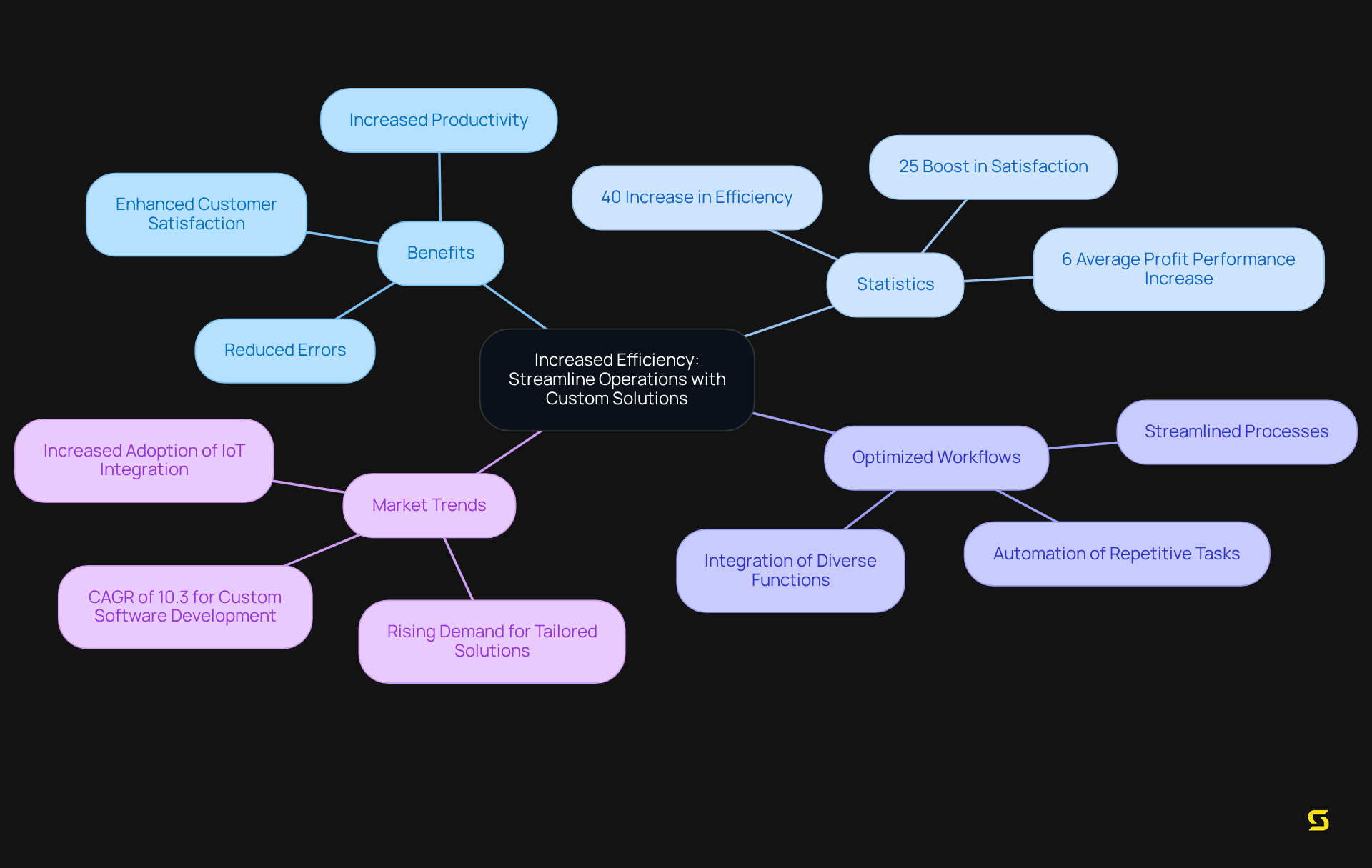
Competitive Advantage: Stand Out with Custom Software
Custom software empowers companies to integrate unique features and functionalities that set them apart from competitors relying on standard solutions. By effectively addressing specific pain points and enhancing user experiences, these companies can cultivate a loyal customer base and position themselves as leaders within their respective markets. This strategic approach not only differentiates them but also establishes a foundation for .
Seamless Integration: Custom Software Fits into Your Existing Infrastructure
Custom software applications are essential for seamless integration with existing systems, facilitating smooth data flow across platforms. This capability significantly reduces disruptions during implementation, thereby enhancing overall operational efficiency. By leveraging existing technology investments while enhancing application solutions, organizations can streamline their processes effectively.
For instance, organizations that prioritize integration report a remarkable 58% boost in revenue, underscoring the financial benefits of aligning technology with business objectives. Furthermore, a study revealed that 83% of organizations consider product integrations a top priority, reflecting the growing recognition of their importance in enhancing sales effectiveness and improving close rates. Notably, 39% of organizations identify integrations as the most crucial element when selecting a service provider, highlighting the essential role of integration in decision-making.
Organizations that have effectively adopted tailored applications frequently experience enhanced operational efficiency, as demonstrated by a logistics company that transitioned from manual tracking techniques to a specialized logistics management system, resulting in more timely deliveries and reduced expenses. However, challenges persist, with 50% of organizations citing the discontinuation of an integrated application as a significant hurdle. Such instances illustrate how custom software not only integrates into current frameworks but also promotes substantial enhancements in organizational performance.
Moreover, 85% of surveyed firms indicate financial losses due to integration-related problems, further emphasizing the necessity for effective custom software solutions. As Fabricio Defelippe, CEO of TUXDI, aptly noted, 'One significant yet overlooked advantage of tailored applications is their capacity to offer a distinctive user experience that distinguishes businesses from others.' This statement underscores the to ensure long-term ROI and adaptability.
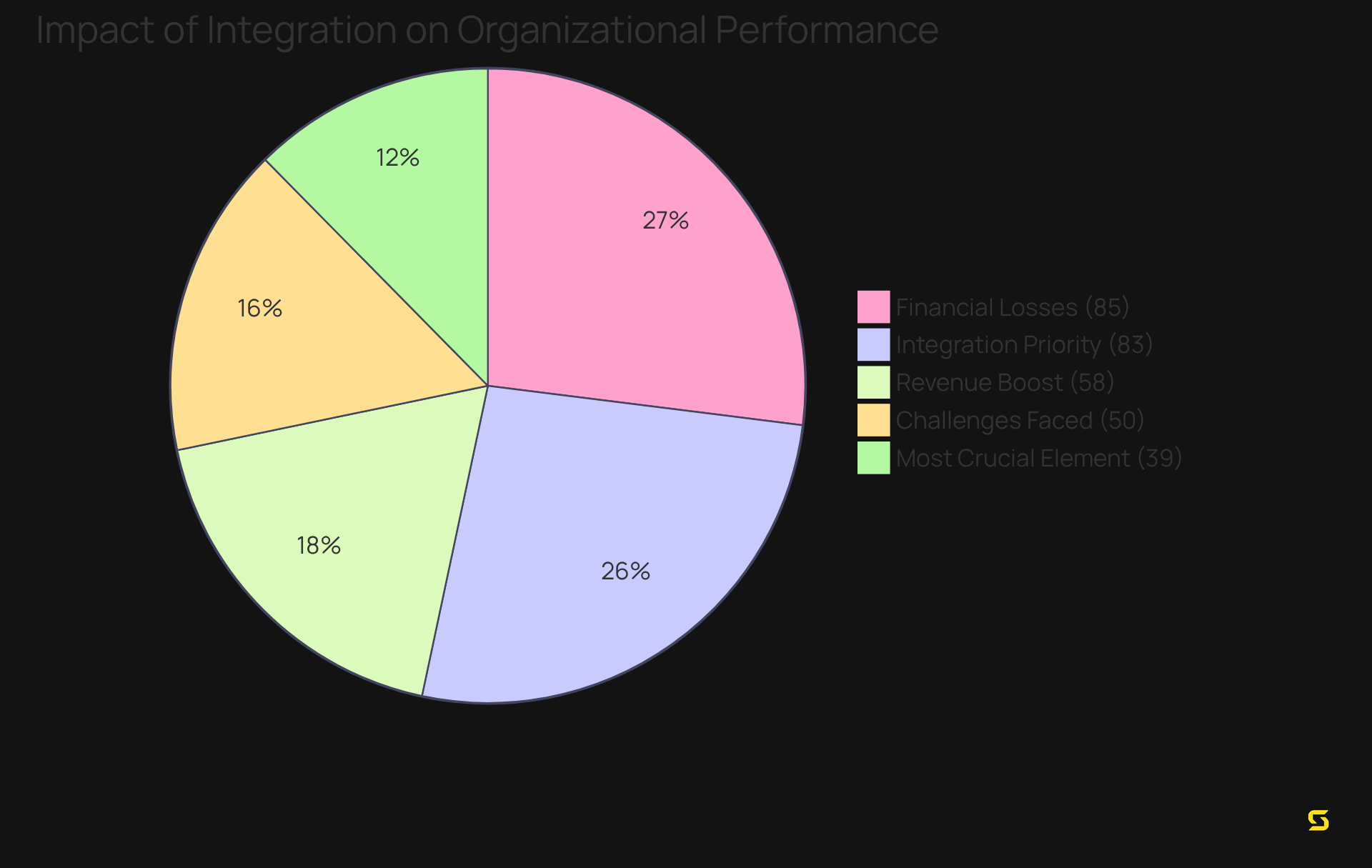
Enhanced Security: Protect Your Business with Custom Software
Custom software applications are essential for integrating tailored security measures that effectively safeguard sensitive information and mitigate risks. By addressing specific vulnerabilities unique to each business, custom software solutions significantly enhance the overall security posture. Organizations that adopt custom software can notably reduce the likelihood of data breaches, which, as of 2024, incur an average cost of $4.88 million per incident—a marked increase from $3.86 million in previous years.
Furthermore, with 65% of data breaches involving internal individuals and 91% of cybersecurity experts noting a rise in cyber attacks due to remote work, implementing custom software solutions is pivotal in establishing robust access controls and monitoring systems to prevent unauthorized entry. In 2025, the focus on custom software for tailored application security protocols will be critical, as companies increasingly recognize the necessity for solutions that not only comply with regulations but also proactively defend against evolving cyber threats.
Tailored security measures, such as encryption and multi-factor authentication, can further bolster defenses, ensuring that sensitive information remains secure. By investing in custom software, companies enhance their security frameworks and foster trust with clients, ultimately leading to improved operational efficiency and growth.
Notably, 47% of small enterprises in the past year, and 60% of small firms cease operations within six months of a cyber incident, underscoring the urgent need to invest in custom software solutions for security.
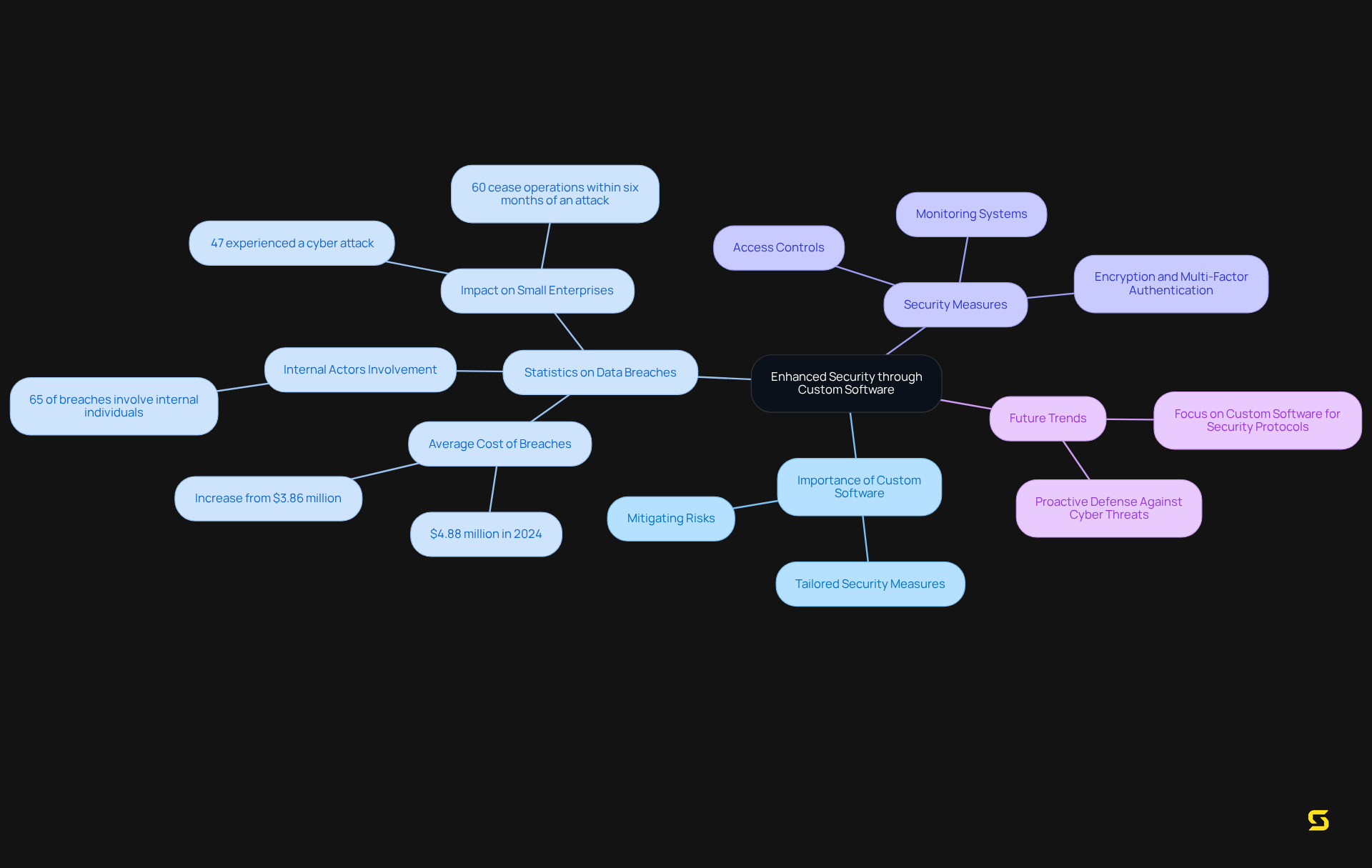
Cost-Effectiveness: Save Money with Custom Software Solutions
Investing in custom software delivers substantial long-term financial benefits. By eliminating ongoing licensing fees typically associated with pre-packaged solutions, companies significantly reduce their overall cost of ownership with custom software. The Provato Group states, "Although it demands a greater upfront investment, custom software applications can be more economical in the long run since they do not necessitate licensing or extra external resources to meet your requirements."
Custom software not only minimizes the need for extensive modifications but also streamlines processes, leading to further reductions in operational expenses. Organizations that adopt custom software frequently observe a return on investment within 12 to 24 months, with many reporting productivity increases of approximately 15%. In fact, ROI for custom software applications is generally realized within 2-3 years, accompanied by a documented 15% enhancement in productivity. This financial efficiency positions custom software as a , empowering companies to allocate resources more effectively and bolster their overall profitability.
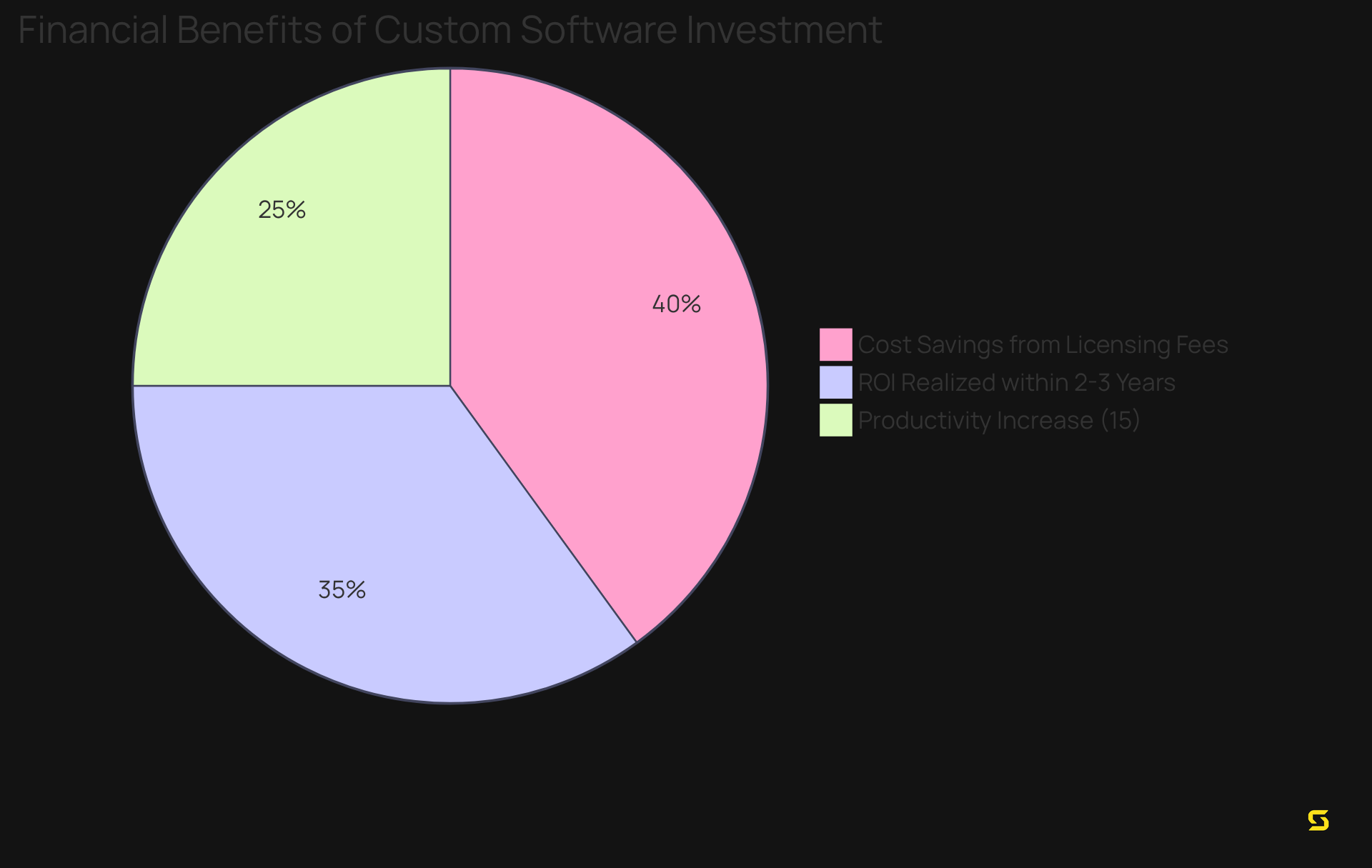
User-Centric Design: Improve User Experience with Custom Solutions
Custom software emphasizes user-centric design in its development, ensuring applications are intuitive and easy to navigate. By prioritizing the needs and preferences of end-users, businesses enhance user satisfaction, which in turn boosts engagement and retention rates. A striking statistic reveals that 90% of users have abandoned an app due to inadequate performance, underscoring the crucial role of performance in user retention.
Real-world examples further illustrate this impact:
- A health tech startup that implemented a tailored telemedicine platform saw improved user engagement through features such as secure messaging and appointment scheduling.
- Moreover, 44% of respondents reported increased customer engagement following user research initiatives, reinforcing the importance of understanding user needs.
- Similarly, Staples experienced an astounding 500% surge in online revenue after a UX-focused site redesign, with each dollar invested in UX yielding a remarkable $100 return, highlighting the financial benefits of prioritizing user experience.
Incorporating user feedback into the development process facilitates continuous improvement, ensuring that applications evolve in alignment with user expectations. This adaptability is vital;
- 71% of publishers indicate that well-organized mobile content enhances user experience,
- while 53% of mobile users abandon a website if it takes longer than three seconds to load.
Ultimately, custom software not only meets the specific needs of organizations but also fosters a , leading to enhanced loyalty and sustained success.
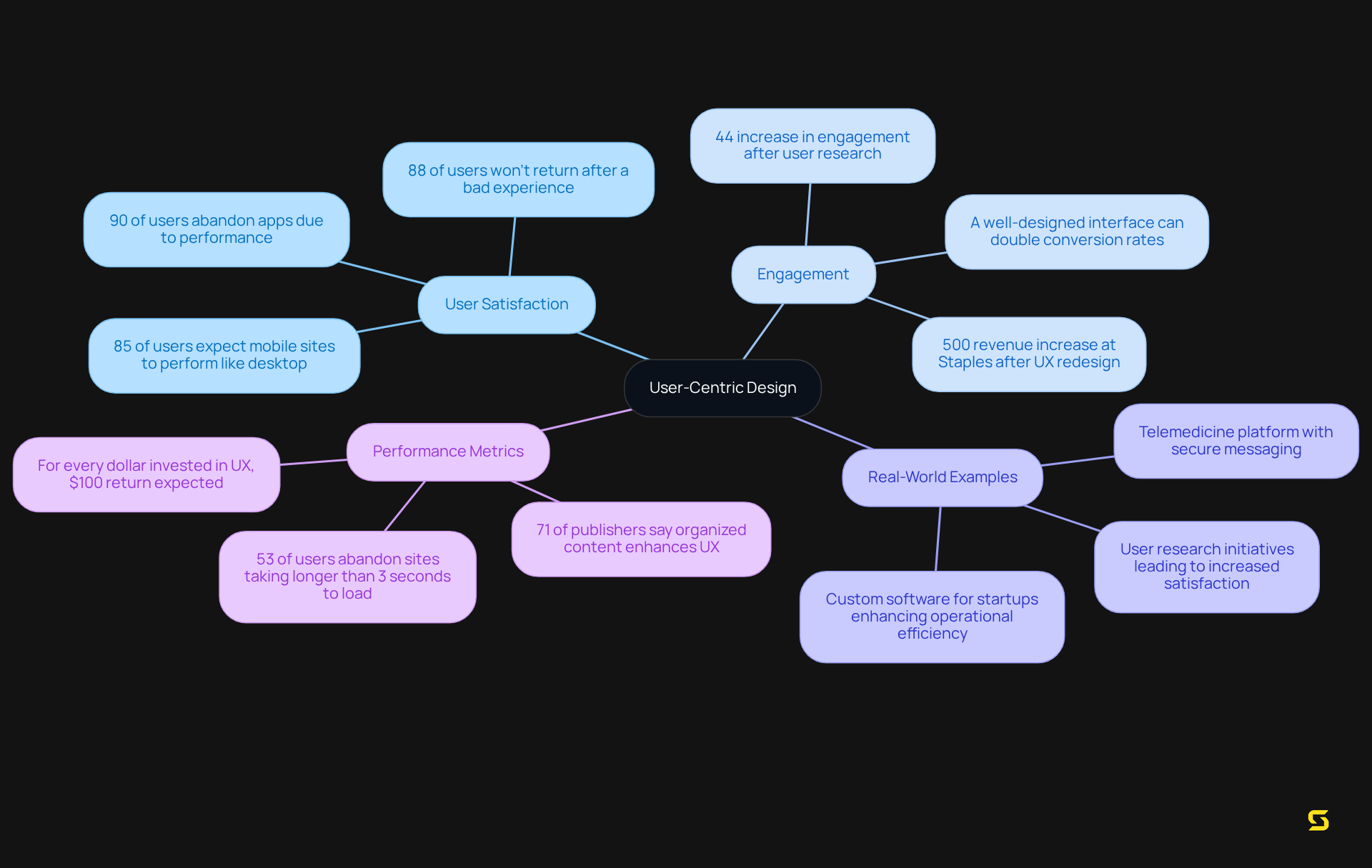
Ongoing Support: Benefit from Continuous Maintenance of Custom Software
Continuous support and maintenance are essential for ensuring that [custom software applications](https://sda.company) operate efficiently and adapt to evolving business needs. , bug fixes, and enhancements not only align the application with technological advancements but also play a crucial role in its long-term success. A proactive maintenance culture can lead to a 30% reduction in system failures and a 20% improvement in overall productivity. Notably, a Fortune 500 company that implemented automated maintenance frameworks reported a remarkable 30% increase in operational efficiency.
Effective maintenance strategies encompass:
- Corrective measures
- Adaptive measures
- Perfective measures
- Preventive measures
Each targeting distinct aspects of system upkeep. Regular updates bolster system security, rectify bugs, and enhance performance, ensuring compatibility with emerging technologies. A case study involving a healthcare application demonstrated that ongoing support resulted in a 15% increase in patient satisfaction due to quicker resolutions of technical issues.
Moreover, companies that prioritize regular updates frequently experience heightened user engagement and loyalty. For instance, an e-commerce platform that swiftly adapted to market changes through consistent updates witnessed a significant surge in sales and customer satisfaction. By investing in a robust maintenance plan, organizations can protect their initial investment in custom software, ensuring it remains a valuable asset that propels business success.
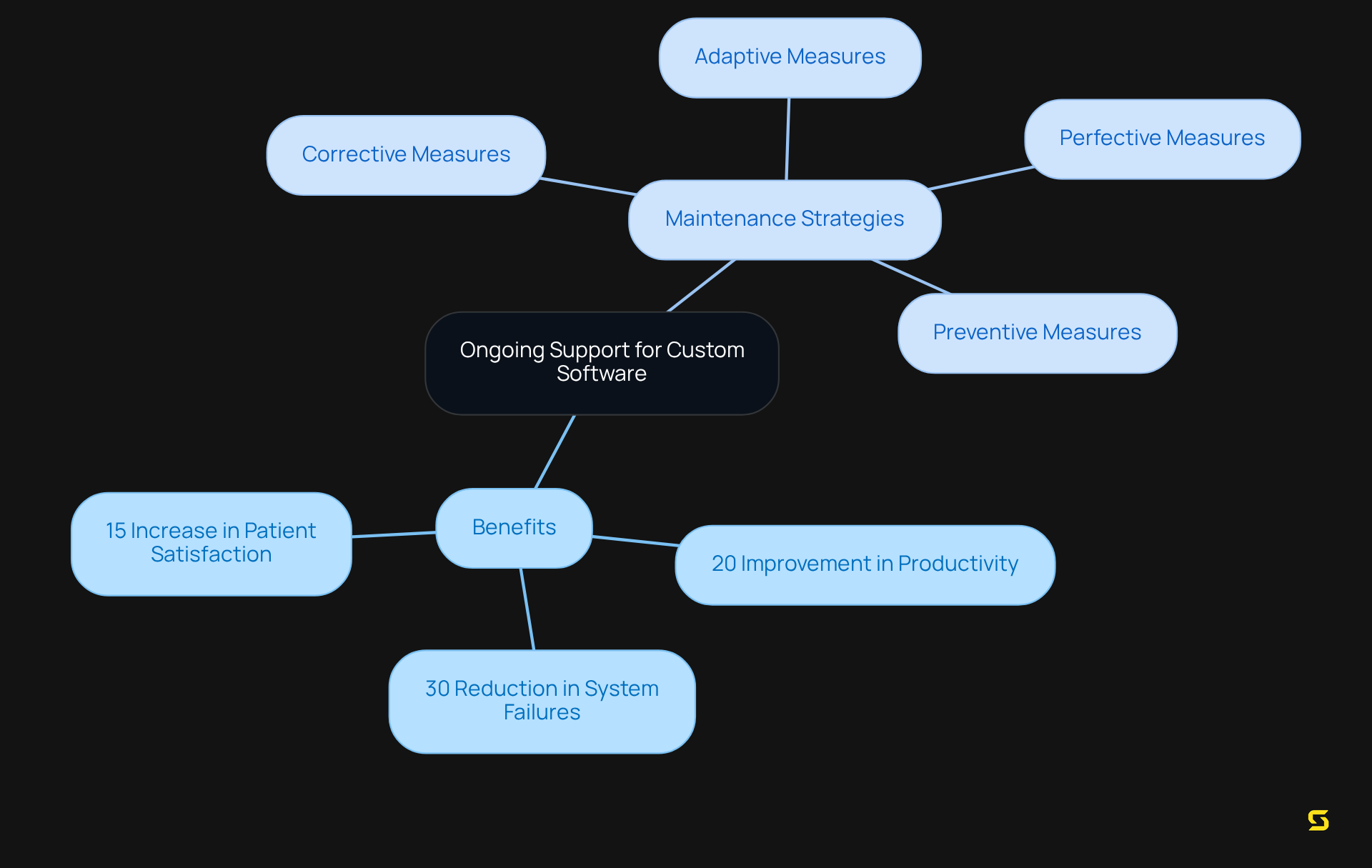
Conclusion
Investing in custom software development is not merely a choice; it emerges as a strategic imperative for SaaS product owners aiming to enhance their operational capabilities and secure a competitive edge. Tailored solutions align seamlessly with unique business processes and adapt to evolving market demands, ensuring that organizations remain agile and responsive. The ability to customize applications fosters innovation, improves user satisfaction, and ultimately drives sustainable growth.
Key insights from the discussion underscore the myriad benefits of custom software, including:
- Increased efficiency
- Enhanced security
- Significant cost savings
Organizations that embrace tailored solutions report notable improvements in productivity and operational effectiveness, with many achieving a remarkable return on investment within just a few years. Furthermore, the ongoing support and maintenance associated with custom software ensure that these applications evolve in line with technological advancements, further solidifying their value as a long-term asset.
In a landscape where differentiation is crucial, custom software stands out as a vital tool for businesses aspiring to thrive. By prioritizing tailored solutions, organizations can not only meet their immediate needs but also strategically position themselves for future success. Embracing the advantages of custom software development is a decisive move that empowers businesses to navigate challenges and seize new opportunities in an increasingly competitive environment.
Frequently Asked Questions
What is SDA and what services do they provide?
SDA specializes in custom software development, offering tailored solutions that meet the unique requirements of various industries, including healthcare, fitness, and SaaS.
How does custom software development benefit businesses?
Custom software development enhances operational efficiency and stimulates growth, with businesses investing in such solutions experiencing productivity increases of 20-30%.
Why is investing in tailored applications important for businesses?
Investing in tailored applications allows businesses to have complete control over functionality and future enhancements, which is crucial for sustainable growth.
What is the projected growth of the global custom software development market?
The global custom software development market is projected to reach approximately $120.22 billion by 2029, indicating a rising demand for tailored program offerings.
What emerging trends are influencing custom software development?
Trends such as artificial intelligence, the Internet of Things (IoT), and the Internet of Behavior (IoB) are reshaping the custom software landscape, enhancing workflows and user experiences.
How does custom software provide enhanced flexibility?
Custom software can be tailored to align with unique business procedures and workflows, adapting as the organization evolves, unlike off-the-shelf solutions that may require operational changes.
What are the reported benefits of using personalized applications?
Organizations using personalized applications report an average operational productivity improvement of 30% and 74% believe that custom software is essential for maintaining competitiveness.
What is the return on investment (ROI) for businesses investing in custom software?
Companies can achieve a remarkable 95% return on investment over three years with personalized applications, with substantial returns typically realized within 12 to 24 months.
How does custom software support scalability for businesses?
Custom software is designed for scalability, allowing companies to efficiently manage increased workloads and adapt to evolving user demands as their SaaS products expand.
What operational improvements have organizations experienced by utilizing tailored applications?
Organizations using affordable tailored applications have reported a 10-15% reduction in operational expenses and a 25% boost in employee efficiency, with significant improvements in customer onboarding times.





